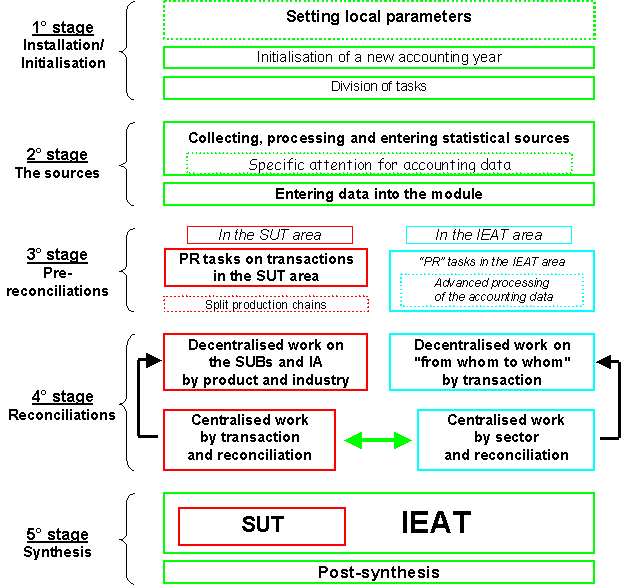| Inputs | Outputs | Itinerary | Tools | Organisation | Storage | IT |
ERETES offers users a five-phase signposted itinerary to compile the national accounts of an accounting year.

The module is portable; this means that it can be installed in any country that wishes to adopt the proposed process of compiling accounts. Each country is unique, both in terms of its economy, society or institutions and as regards the specific characteristics of its statistical apparatus. At the moment of its installation, the module has to be adapted to those national characteristics. This is mainly done through the choice of the local classifications.
There is also room for some flexibility in implementing the method proposed by the module, in deciding locally which components of the central framework to choose, etc.
This stage is a prerequisite for using ERETES and occurs only once.
The task of compiling National Accounts relies entirely on the availability of statistical data which take account of the full economic life of the country. Of course, there are areas which escape the statistician's reach. But whatever exists should be used, because different approaches to a single phenomenon can frequently yield additional information.
The quality of each source must be verified. In parallel, the content of each source will be analysed, so that it can be transposed according to the classifications of National Accounts. Lastly, to be incorporated into the database, the data must be coded according to the attributes stipulated by the module.
Particular attention must be paid to the accounting data supplied by the institutional units.
Each source must be processed in its entirety, irrespective of where it will
be used later.
This next phase helps to achieve better preparation of sources for use in the decentralised tasks of phase 4.
Pre-reconciliation is necessary :
For the field of the SUT (supply/use table), pre-reconciliation covers transactions only.
This new phase marks the beginning of the active phase of compatibilisation between all existing sources, and of the setting up of estimations for the parts of economy which statistics know poorly or even do not know at all. This work is done by alternating two complementary and
iterative approaches ;
These tasks are carried out on local posts.
Throughout this analytical approach, the maintenance of divergences between the various points of view will however continue to be accepted:
Once a satisfactory quality has been arrived at for the industries, the products, the transactions and the institutional sectors, we move on to the synthesis phase, which involves completing the following tasks :